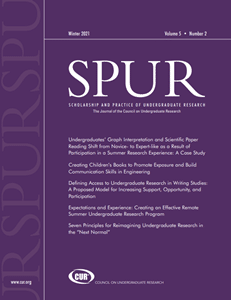SPUR (2021) 5 (2): https://doi.org/10.18833/spur/5/2/8
More Articles in this Issue
- ‐ Jenny Olin Shanahan, Jeanne Carey Ingle, Jing Tan, Thayaparan Paramanathan, and Kenneth W. Adams
SPUR (2021) 5 (2): https://doi.org/10.18833/spur/5/2/5 Abstract:Bridgewater State University moved undergraduate research (UR) programs online in early 2020 in response to the COVID-19 pandemic. A few months later, Black Lives Matter demonstrations, the university’s racial justice reckonings and recommitments, and the disproportionate effects of the pandemic on Black and Brown communities guided the reexamination of UR policies and practices. Compelling results of mixed-methods research with faculty mentors and student researchers also motivated this work. The authors recommend seven principles for leading UR programs during the mutually reinforcing crises of the pandemic, racism, partisan division, and economic austerity.
- Practice‐ Lisa Bosman and Kelli Chelberg
SPUR (2021) 5 (2): https://doi.org/10.18833/spur/5/2/1 Abstract:In an attempt to overcome barriers faced by engineering students, a strengths-based approach to an Introduction to Engineering course was developed and deployed at a minority-serving institution in the US Midwest. This course-based research experience provided an environment that allowed students to learn about various engineering disciplines and improve their communication skills while engaging in a constructivist-grounded process. Students were asked to construct their knowledge and make meaning of the engineering disciplines through the creation of a children’s book that introduced young readers to engineering. Although book creation in an engineering course may seem unconventional to many, this course produced students with sound communication skills and a fundamental understanding of engineering that has laid the foundation for their academic careers.
- Assessment‐ Anne U. Gold, Rachel Atkins, and Karen S. McNeal
SPUR (2021) 5 (2): https://doi.org/10.18833/spur/5/2/2 Abstract:Research Experiences for Undergraduate (REU) programs often introduce students to scientific research and STEM career possibilities. However, the program impact on students and their research skill development is not well understood. In a case study with 10 REU students, the authors used eye-tracking and self-report data to determine student strategies for reading scientific papers and interpreting graphs at the beginning and end of the program. The strategies of REU students and science experts were then compared. The REU students changed their strategies and performed more like experts at posttest. These findings indicate that, during the REU, students acquired expert-like strategies necessary to engage with scientific articles and extract key information from graphs. The study demonstrates that eye-tracking can document skill growth in REU students.


